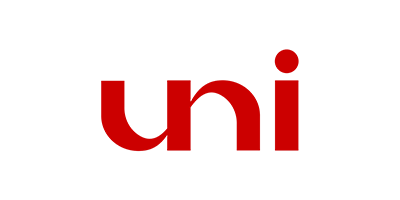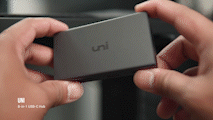Make the Most of Your USB C Hub with These Tips and Tutorials
March 02, 2023 4 min read
As technology advances, more and more devices are beginning to use USB C ports.No longer are usb c dongles necessary or even desirable as USB C hubs allow for far more range and flexibility when connecting to many different types of devices. With the increasing number of ports available on these USB c hubs, it can be difficult to know how to get the most out of them. (Especially for those who just grab any USB C Hub on Amazon for just 1 sec without noticing what hub you have got.)

📷 Credit to Jakob Owens
Whether you’re a student looking for ways to streamline your digital workflow or a teacher in need of a few extra ports for your classroom, this blog post is here to help. Read on for some tips and tutorials on how to get the most out of your USB C hub!
Understand the Different Types of Ports Available
Utilize Multiple Displays
If your hub features an HDMI port, you can use it to connect an external HDMI enable display at once—a great way to maximize productivity if you’re working from home or in an office setting. Just make sure that all connected monitors support HDMI connections; otherwise, they won’t display anything when plugged into the hub!
But remember, it won't function unless all the connected monitors support its connection specifications. And for ultra-high resolution streaming of 4K@60Hz videos, be aware that both source as well as destination device must have DP 1.4/Alt Mode enabled or you'll settle for only half the frame rate at 4K @30 Hz with a DP1:2 mode port!
i.g. Check that your device supports this mode; otherwise, it will operate in DP 1.2 mode, which limits you to 4K@30Hz. To get 4K@60Hz on a MacBook Pro 13 inch, you have to ensure you get the 2020 model or newer, for 15 inch, 2018 or later with AMD GPU.
For USB C phones (Samsung S23, LG, etc), 4K@60Hz is not possible with this dongle as the USB C port is not capable. DP 1.4 dongles with half of the data lanes allocated to USB-A 3.0 ports means you are left with half of DP 1.2 bandwidth.
Additionally, keep in mind that not all USB C hubs support multiple displays; always check the specifications before making any purchases will save you from disappointment.
However, if you have got a monitor with DP ports (make sure it have got one DP input and one DP output), you can easily add extra display with single DP to DP cable. (the DP cable should supply MST function.)
Take Advantage of Data Transfer Speeds
USB C hubs boost impressive data transfer speeds when compare to micro USB or USB 2.0/ USB 3.0. Most USB C hub in the market should embrace at least USB 3.0 port even when blind buy on any market. However, if you only want to use your blue tooth mouse or keyboard USB 2.0 is enough, leave the USB 3.0 ports for USB Sticks/ Thumb Drives/ SSD. ( Yes, I know USB 3.1 should has blue rubber, however, some of the brand might design the hub for a unify the overall design but to sacrifice the blue sign)
However, a few usb c hub data transfer speeds is scarily fast—upwards of 40Gbps when equipped with Thunderbolt 4 ports! That’s four times faster than traditional USB 3.0 speeds, so make sure you take advantage of this feature whenever possible by connecting devices that require high-speed access (such as external hard drives). This will ensure that large files are transferred quickly and efficiently without any hiccups along the way!However, this speed only inThunderbolt 4 or USB4 Hub, which is quite expensive at the moment. Actually, you cannot have a real Thunderbolt 4 / USB4 hub cost below $199 (remember Thunderbolt 4 hub is way different form usb c hub Compatible with Thunderbolt 4).
Investing in a USB C hub is a great way to streamline your digital workflow no matter what type of device you’re using—and with these tips and tutorials, you should have all the information necessary to get started! From understanding different types of ports available on your hub, utilizing multiple displays when needed, and taking advantage of lightning-fast transfer speeds—there are plenty of ways that these devices can simplify and enhance your daily activities–all while helping save time and money in the long run!
So go ahead; give one a try today!
You won't regret it!
Leave a comment
Comments will be approved before showing up.
Also in Blog
How to Distinguish Low-Quality Electronic Waste on E-Commerce Platforms in 2025
March 19, 2025 3 min read
With the rise of online shopping, distinguishing between high-quality electronics and low-quality e-waste has become a critical skill. Many e-commerce platforms are flooded with questionable products that look appealing but often have serious quality and longevity issues.

Maximizing Your Internet Speed: The Ultimate Guide to Using a USB-C to Ethernet Adapter
July 12, 2024 4 min read
Read More Related Products
Recent Articles
- How to Distinguish Low-Quality Electronic Waste on E-Commerce Platforms in 2025 March 19, 2025
- Maximizing Your Internet Speed: The Ultimate Guide to Using a USB-C to Ethernet Adapter July 12, 2024
- How to Identify if a Device Supports UHS-II or UHS-I Protocols? June 24, 2024
- How to Use a USB-C Hub? Everything You Need to Know May 28, 2024
- Do I need a type c hub? What do you need to know before buying? April 12, 2024
- Can I Get 4k With USB-C to HDMI Cable or Hub? January 15, 2024
- Which USB-C Hub Should You Get? (Checklist) January 08, 2024
- Does USB-C Over Ethernet Work To Get Speedier Internet? January 01, 2024
- DisplayPort Over USB Type-C: The DP Alt Mode in Working December 27, 2023
- How to make Android phone Charge Faster (technician advice) December 11, 2023





